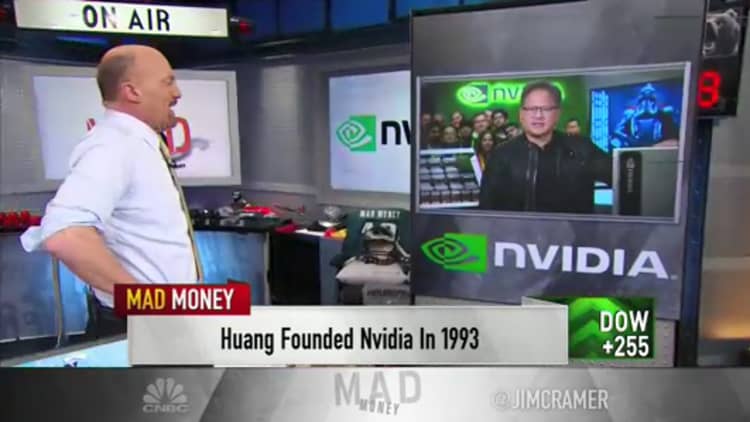Nvidia stock fell by 6 percent on Thursday after the company reported better-than-expected earnings and lower-than-expected revenue guidance.
Here are the major numbers:
- Earnings: $1.76 per share, excluding certain items, vs. $1.66 per share as expected by analysts, according to Thomson Reuters.
- Revenue: $3.12 billion, vs. $3.10 billion as expected by analysts, according to Thomson Reuters.
Overall, Nvidia's revenue grew 40 percent year over year in the second quarter of its 2019 fiscal year, which ended on July 29, according to a statement.
With respect to guidance, Nvidia says it expects to post $3.25 billion in revenue, give or take 2 percent, in the fiscal third quarter; analysts were expecting $3.34 billion for that period, according to Thomson Reuters. That outlook excludes contributions from cryptocurrency products, Nvidia chief financial officer Colette Kress told analysts on a conference call on Thursday.

The company expects that in the fiscal third quarter its gross margin will come in at 62.8 percent, give or take 50 basis points, excluding certain items, which is in line with the FactSet analyst consensus.
While Nvidia has become trendy given the use of its graphics cards for artificial intelligence computing, its chips are commonly used to improve the performance of games in PCs, and most of Nvidia's revenue comes from its gaming business segment, whose revenue came out to $1.81 billion, above the $1.75 billion consensus estimate among analysts polled by FactSet.
The second-largest segment, data center, exceeded the $744 million estimate, at $760 million in revenue. The professional visualization category produced $281 million in revenue, above the $257 million estimate.
Nvidia's automotive segment came in at $161 million, above the $148 million estimate. Revenue from original equipment manufacturers and intellectual property, including products for cryptocurrency mining, was $116 million -- a 70 percent sequential drop, and below the $188 million FactSet analyst estimate.
"Our revenue outlook had anticipated cryptocurrency-specific products declining to approximately $100 million while actual crypto-specific product revenue was $18 million, and we now expect a negligible contribution going forward," Kress said. Nvidia's CEO, Jensen Huang, put it another way, saying that currently executives think cryptocurrency won't be material to the company for the second half of the fiscal year.
While the cryptocurrency impact will drag down the OEM and IP business and bring year-over-year declines in the fiscal third quarter, Kress said executives are hoping that "absolutely" Nvidia's data center business will grow, and they think the gaming business will grow as well.
Nvidia's operating expenditures of $818 million were about $8 million above what analysts had expected for the quarter.
In the fiscal second quarter Nvidia announced that its chips are part of the world's fastest supercomputer, the U.S. Department of Energy's Summit.
But after the quarter ended, Nvidia announced the next generation of its graphics cards, Turing. Turing-based graphics cards will become available in the fourth quarter, Kress said.
"We believe gaming demand is seeing some softness due to a product transition (Turing), which we anticipate will be launched at the end of August," RBC Capital Markets analyst Mitch Steves wrote in a note to clients. In the meantime, Intel has begun teasing its own graphics cards that are meant to challenge Nvidia's.
Nvidia stock is up almost 35 percent since the beginning of the year.



